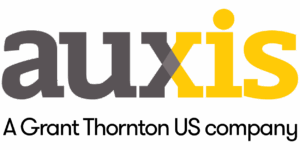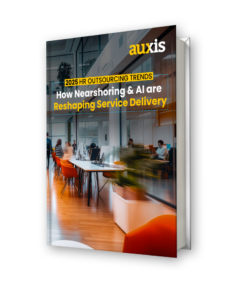In brief:
- 61% of HR leaders say growing demands exceed their organization’s capacity to deliver.
- The benefits of outsourcing human resources are compelling, with the right outsourcing providers delivering the talent, processes, and technology to drive efficiency, bridge talent gaps, and let internal teams focus on people and culture.
- 87% of HR leaders are turning to HR outsourcing to accelerate AI adoption.
- Latin America has emerged as the #1 HR outsourcing destination for North America, combining lower costs with real-time collaboration and top-tier talent with the same knowledge and experience as the U.S.
Many human resources (HR) teams in the U.S. are overworked and stretched thin – confronting high turnover and labor shortages internally at the same time demands on their department continue to grow. The benefits of outsourcing HR are clear – delivering the talent, best practices, and technology to bring relief to an overburdened function.
Some 75% of HR leaders say their managers are overwhelmed by the expanding scope of their responsibilities, while 55% report their current technologies no longer meet business needs – a clear signal of persistent operational strain and modernization gaps, states Gartner’s 2025 HR focus areas report.
As a result, more than half of HR professionals are carrying extra workloads and a similar number (56%) report a lack of manpower – triggering a high risk of turnover. In fact, Business Insider reports that HR now experiences the highest turnover rate of any job function, with job searches for HR roles declining nearly 5% in the first half of 2025, indicating widespread disengagement, burnout, and talent shortages.
HR outsourcing offers an effective solution to these urgent challenges. By offloading daily tasks like payroll processing, benefits administration, and HR help desk support to quality external providers, HR leaders can alleviate the strain on their internal teams, significantly reduce operational costs, and achieve efficiencies through best practices and automation that enable them to do more with less.
U.S. organizations are increasingly turning to the benefits of HR outsourcing – with 44% of global HR outsourcing market growth projected to come from North America through 2029.
What are the benefits of outsourcing HR functions?
Gartner reports 87% of HR leaders acknowledge the urgent need for HR transformation, but only 27% have a fully integrated plan. That gap underscores why HR outsourcing is growing.
In fact, HR ranks among the most-outsourced enterprise functions on Deloitte’s 2024 Global Outsourcing Survey, with 57% of organizations relying on third-party providers to support HR processes. Let’s examine four key advantages of HR outsourcing for your organization:
1. Gain instant access to experienced HR talent
Less than 10% of HR departments are currently achieving “functional excellence,” according to a 2025 Gartner CHRO guide. This deficiency is due in part to the increased burden on short-staffed HR departments causing burnout and record-high turnover.
More than 60% of HR leaders surveyed for Gartner’s 2025 HR Priorities Report say that new demands exceed their capacity to deliver, so it’s no surprise that organizations are turning to outsourcing for relief and scalability.
In fact, “access to talent” has overtaken cost as the #1 outsourcing driver for the first time since the pandemic, according to the Shared Services and Outsourcing Network’s (SSON) 2025 State of the Shared Services & Outsourcing Industry Global Market Report.
One of the main benefits of outsourcing HR services is direct access to a deep pool of top HR professionals who can successfully take over administrative work – giving internal teams the bandwidth to focus on the people and culture that matter most. While some companies once hesitated to outsource HR because of its employee-facing nature, the shift to remote work post-pandemic has made organizations comfortable managing high-touch functions like HR remotely – under the right circumstances.

In this climate, Latin America – and particularly, Costa Rica – has emerged as the #1 HR outsourcing destination for North America. Leading Fortune 500 companies have operated captive HR shared services in Costa Rica for more than a decade, creating a deep pool of HR talent with the same knowledge and experience levels you can find in the U.S. – but at a fraction of the cost.
Nearshoring further offers the cultural alignment, strong English proficiency, and real-time communication that support white-glove HR service delivery.
Not surprisingly, HR services are now offered by 80% of Latin American shared service organizations (SSOs), but less than half (43%) of global organizations, according to the State of the GBS and Outsourcing Industry Report by SSON and Auxis.
Organizations based in the U.S. can expect quick resolution of issues and efficient communication between employees and nearshore HR teams, avoiding the frustration and delayed responses often associated with doing business across faraway time zones.
Demanding real-time response from Asia-based outsourcers doesn’t necessarily drive seamless service. Asia’s saturated job markets leave offshore providers struggling to hire and retain high-level, “A team” resources for overnight shifts that match U.S. business hours, leading to quality concerns, high turnover, and increased labor costs.
North American HR processes are also not a main processing service in Asia’s top outsourcing destinations, which can impact performance. Read our case study to learn how a leading Fortune 50 retailer recently shifted HR functions to Auxis’ Costa Rica delivery center after struggling with offshore challenges and an inability to find talent familiar with the nuances and complexities of U.S. HR practices in India.
2. Optimize processes and employee experiences with best practices and automation
For many businesses, HR investments fall to the bottom of the priority list because the function is often seen as a cost center rather than a revenue driver. Yet, companies still expect HR to work just as effectively as other departments.
Reducing costs and increasing efficiency ranked as top priorities for 68% of HR leaders in SHRM’s 2024 State of the Workplace report – but only 31% said they were achieving those goals effectively.
That’s where HR outsourcing benefits deliver real value. Quality partners combine operational excellence with access to advanced AI and automation tools – minus the heavy upfront investment. Unlike low-cost staffing solutions, top providers bring a proven ability to optimize processes, leverage the latest technology, and identify opportunities to improve HR functions across industries.
AI and automation tools are a powerful accelerator for HR, capable of bridging labor gaps by streamlining tasks like résumé screening and benefits management, personalizing onboarding and training to improve employee experiences, and turning data into actionable insights. Read our new report, “The AI in HR Playbook for 2026,” to learn how leading HR organizations are leveraging AI to improve efficiency and employee experiences.

But while 76% of HR leaders surveyed by Gartner’s recent GenAI for HR leaders webinar said they believe they will be lagging in organizational success if they don’t adopt AI within the next 12-24 months, 60% say they are unsure about the best path forward.
What’s more — 77% of employees report HR tech has actually slowed productivity (Gartner’s 2025 priorities report) because HR leaders don’t know how to use it right. Only 30% of HR employees say they received the training they need to use AI tools effectively, according to a 2025 Fortune magazine report.
Hiring a quality HR outsourcing provider is a smart fix that can help bring focused expertise for identifying the best automation and AI opportunities, selecting the right tools for your organization, prioritizing a roadmap, and achieving sustainable digital transformation success. They also provide experienced professionals already skilled in AI-driven HR operations.
Leading providers further bring the best practices and strategic expertise to ensure your processes are optimized before automation – helping organizations run not just faster, but smarter.
It’s no surprise that 87% of HR leaders now turn to outsourcing to accelerate AI adoption –accessing the digital tools, talent, and expertise they lack in-house (Deloitte Global Outsourcing Survey 2024).
3. Reduce costs without sacrificing quality
Amid inflation and labor shortages, HR salaries in the U.S. reached their highest level in 20 years in 2023 – and HR stood as the second-highest area of increased compensation investment in 2024, according to a SHRM salary report. While salaries stabilized more this year, HR’s overall labor costs continue to rise as high turnover and a tight hiring market prompt investment in merit increases and employee engagement areas like learning & development to retain top talent.
A quality HR outsourcing partner lets you access skilled HR talent at a fraction of the cost. Top nearshoring locations like Costa Rica, Colombia, or Mexico can deliver average labor arbitrage of 30-50% compared to hiring similar roles in the U.S. – while also absorbing costs associated with recruitment, training, overhead, and administrative burdens.
In addition, your HR outsourcing services provider should deliver cost savings by regularly measuring productivity and KPIs. With higher visibility and a continuous improvement mindset, the cost to serve tends to improve given the increased efficiencies.
And bonus: All these cost savings can be invested back into the organization to fund digital transformation initiatives that drive additional efficiencies and savings.
But with today’s market conditions driving a need for white-glove HR services that increase employee satisfaction, HR leaders are also realizing the need to look beyond the lowest outsourcing cost to ensure the highest performance.
67% of enterprise leaders are increasing budgets for next-gen, strategic outsourcing partnerships that combine lower costs with the ability to design and execute digital strategies, provide actionable insights, deliver more advanced process tiers, and structure an outcome-driven approach.
Deloitte 2024 Global Outsourcing Survey
Only 34% prioritized pure cost reduction as their biggest outsourcing driver, down from 70% in 2020.
Nearshoring provides a compelling alternative to the traditional Asia-based offshore model in this landscape. While Asia’s value proposition often hinges on labor arbitrage – necessitating a volume-driven, one-size-fits-all approach – top nearshore providers prioritize strategic partnership that offers greater opportunities for flexibility and customization.
This distinction is particularly significant in HR, where cultural alignment, language proficiency, real-time communication, and high-performance teams trained to your specific HR policies and procedures are non-negotiable.
While Asia-based models might seem slightly cheaper upfront, the total cost can be higher in the long run once you consider hidden costs like travel expenses and notoriously high turnover rates that impact consistency and performance. Staff unfamiliar with U.S. HR nuances can also lead to errors in complex areas like payroll, benefits, and compliance that drive additional cost.
A growing trend toward multi-location outsourcing models in Latin America is further tipping the costs-benefits analysis toward nearshoring – helping HR organizations take advantage of hybrid solutions that combine Costa Rica’s HR expertise with opportunities for even greater cost savings in other top Latin American markets. For instance, companies are retaining more complex HR work in Costa Rica and sending more entry-level tasks to Colombia, where skilled talent combines with the largest labor arbitrage in Latin America.
4. Reduce HR turnover while gaining bandwidth for strategic work
In the scramble to recruit and retain talent in today’s labor market, HR scope has expanded significantly. Besides the wealth of daily administrative tasks that drive employee experience, teams are tasked with adding innovation to the recruiting process; creating a strong company culture; increasing employee benefits, perks, and work-life balance; providing upskilling, employee training, and development opportunities; and more.
It’s no surprise HR ranks as the least-satisfied business function as the sheer volume of tasks its employees must complete builds a significant barrier to success (Workday What are the Biggest HR Challenges of 2025? report).
The right outsourcing partner provides your in-house HR team with relief from day-to-day administrative duties, allowing them to reclaim bandwidth for strategic activities that are more applicable to their cost and skills.
Reducing HR workloads and allowing internal staff to focus on more interesting and important work is key to reducing HR burnout and turnover. Continuous churn has serious impact on HR organizations – contributing to inconsistent communication with employees, delays in resolving issues, and lack of employee trust.
Employees who consider their HR department as “effective/very effective” are significantly less likely to be actively searching for another job (11%), compared to those that rate HR as “slightly effective/not effective” (33%), according to SHRM’s 2025 State of the Workplace report.
Exceptional partners also help you improve employee loyalty and engagement by holding themselves accountable to service-level metrics like payroll accuracy and fast employee response and resolution that drive greater satisfaction.
By taking over repetitive yet unavoidable tasks, HR outsourcing reduces burnout and turnover, one of the most overlooked HR outsourcing advantages. It also gives internal staff the bandwidth to grow within their roles – developing the skills to adapt and succeed in today’s fast-changing work landscape.

Why Auxis: Delegate daily HR tasks and focus on what matters most
Modern HR challenges have led to a surge in HR outsourcing. But not all outsourcing providers deliver the same results.
More U.S. companies are increasingly finding success with quality nearshore partners like Auxis, which combines significant cost savings with real-time communication and highly skilled HR talent that function as a seamless extension of your internal team.
With the right people, processes, and technology to keep your daily HR operations running smoothly, Auxis’ HR outsourcing solutions free up HR departments to focus on the strategic initiatives that matter most to business success.
Want to learn more about how nearshoring and automation can transform your HR function? Schedule a consultation with Auxis today – or visit our resource center for more HR outsourcing tips, strategies, and success stories.
Frequently Asked Questions
How does HR outsourcing reduce costs?
What are the benefits of HR outsourcing?
Is it good to outsource HR?
How does HR outsourcing work?



